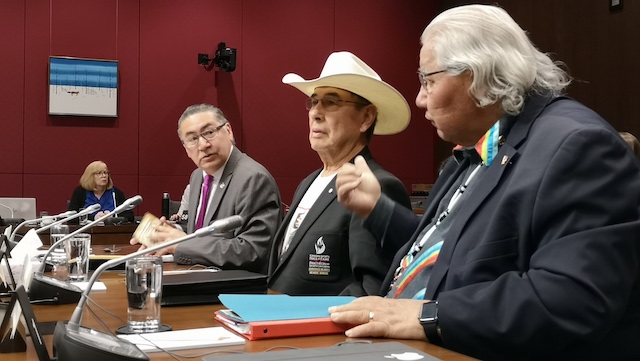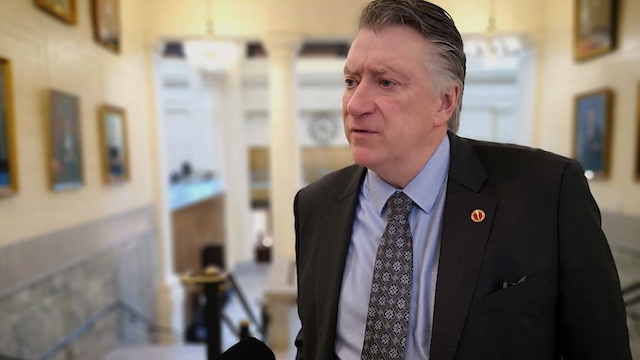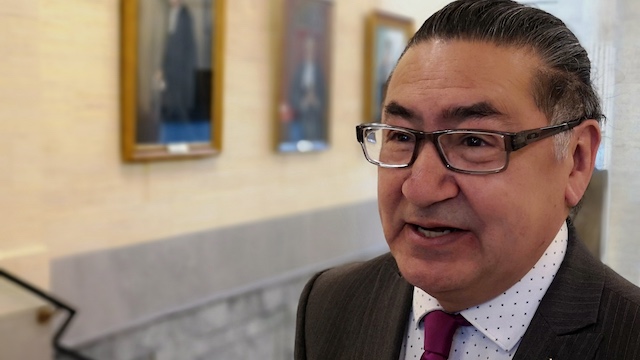Justin Brake, Todd Lamirande
APTN News
If Bill C-262 is to pass before the House rises next month, some Conservative Senators will have to be convinced it won’t create new problems for Canada.
On Tuesday Cree MP Romeo Saganash’s private members’ bill had its first day before the Senate Standing Committee on Aboriginal Peoples.
If passed, it would require Canada to align its laws with the United Nations Declaration on the Rights of Indigenous Peoples (UNDRIP), which articulates the global minimum human rights standards for Indigenous Peoples.
But the proposed legislation, introduced in the House of Commons by Saganash in 2016, could meet its demise on the order paper if its proponents, and witnesses who will address the committee in the coming days, don’t convince Conservative senators the bill won’t have unintended legal and economic consequences for Canada.
“We all acknowledge that Canadians, I believe, overwhelmingly support the Declaration on the Rights of Indigenous Peoples,” Conservative Senator and committee Deputy Chair Scott Tannas told APTN News Tuesday. But if [the bill] involves more court cases and economic disruption, they’re not in support of it,” he continued, adding Canadians have “never been asked that question.
“We don’t know if they’re in support of it — but I suspect they’re not. So we need to get clarity around this, and that’s our job here in the Senate.”
(From the left, NDP MP Romeo Saganash, Wilton Littlechild, and Senator Murray Sinclair at the Senate hearings Tuesday. Photo: Justin Brake/APTN)
The committee heard from several witnesses Tuesday, including Saganash himself, and Senator Murray Sinclair, who is the bill’s senate sponsor and, a former judge and chair of the Truth and Reconciliation Commission.
“A lot is being made of the possibility that the U.N. Declaration itself is going to become the law of Canada by virtue of this bill, and that is not the case,” Sinclair said in his opening remarks to the committee Tuesday.
“People need to stop suggesting that, because the only extent to which this bill will have an impact anywhere in that direction is that it will call upon Canada to look at its legislation and to make its legislation consistent with the principles that are set out in the Declaration.”
The Act, specifically, would require the federal government, “in consultation and cooperation with indigenous peoples in Canada, [to] take all measures necessary to ensure that the laws of Canada are consistent with the United Nations Declaration on the Rights of Indigenous Peoples.”
Laurie Sargent, an assistant deputy minister with Justice Canada, testified to the committee that the government, which supports C-262, would use the legislation as part of a “comprehensive approach” to achieving the goals of the UNDRIP.
Sargent said the bill “provides a framework” for the feds to “ensure that federal laws contribute to achieving the objectives of the Declaration,” and that the work would be done “in cooperation, collaboration and consultation with Indigenous Peoples.”
Cree Senator Mary Jane McCallum said concerns that C-262 would give Indigenous Peoples a “veto” over resource development projects has amounted to “fear mongering.”
She said this notion “creates a conflict of interest with Parliamentarians supporting industry over First Nations’ rights.”
(“We need to get clarity around this,” says Senator Scott Tannas of Bill C-262. Photo: Justin Brake/APTN)
Joe Wild, a senior assistant deputy minister with Crown-Indigenous Relations and Northern Affairs Canada, told the committee C-262 will help Canada implement UNDRIP.
The bill, if passed, would require Crown-Indigenous Relations to report to Parliament annually on the progress made toward achieving the bill’s goal.
Wild said the bill would hold decision-makers to account for their work implementing UNDRIP.
“It also provides transparency for Canadians across the country in that they’ll be able to see that there is a plan and that they’ll then be able to judge for themselves [if] the measures the government is taking are adequate to implement the declaration,” he added.
In 2016 former Liberal Justice Minister Jody Wilson-Raybould called the bill “unworkable,” saying it was a “political distraction to undertaking the hard work actually required to implement [UNDRIP] back home in communities.”
Tannas asked Sargent if she could explain the government’s change in position, after Wilson-Raybould and Crown-Indigenous Relations Minister Carolyn Bennett stated the Liberals’ support for the bill in 2017.
“There was a shift, and I’m not going to get into the reasons for that,” Sargent said, explaining that the bill was regarded as part of a “more ambitious plan to move the agenda of the U.N. Declaration forward. And in the end C-262 has carried through, whereas some of those other elements may not have.”
Last year, against major pushback from First Nations leaders, the Trudeau government halted its plans to overhaul Indigenous rights-related legislation before the 2019 election.
Grand Chief Wilton Littlechild, who testified alongside Saganash and Sinclair, told the committee Tuesday that in his 25 years attending United Nations meetings in the fight for Indigenous rights, and in drafting the U.N. Declaration, that he is familiar with resistance to the human rights standards set out for Indigenous Peoples.
“I can assure you I heard every single argument against a declaration, why we should not have a declaration,” he said.
“We were only trying to catch up to the rest of the world. They had human rights. We didn’t. We wanted to catch up to the rest of the world. And the U.N. Declaration was one way to do it.”
(NDP MP Romeo Saganash introduced Bill C-262 as a path towards reconciliation. Photo: Justin Brake/APTN)
Saganash, a residential school survivor, told the committee C-262 is an important step toward reconciliation.
“When I came out of residential school after 10 years, I set out to do two things,” he said.
“One of them was to go back to the bush, live off the land, which I did for two years. But importantly, perhaps, was the promise to reconcile with the people who put me away for 10 years. And Bill C-262 represents that reconciliation for me.”
Speaking with APTN after the committee hearing, Tannas said the Senate “has over the last 100 years traditionally not dealt very well with private members’ bills.
“It’s just been one of those things,” he said, adding C-262 “is not getting treated in any different way than many private members’ bills that find their way into the Senate.”
Tannas said in the coming days committee will hear from witnesses who will speak more to the concerns some have over C-262’s implications for Canadian law and economic uncertainty.
Sanagash told APTN that the same concerns were already raised when the bill was sent to the House of Commons committee, which heard from more than 70 witnesses and experts.
“The study of this bill has happened, and it’s been in the work for three decades now,” he said. “We’ve been discussing these rights, inherent rights, for the last three decades. So I think it’s important to move on now with reconciliation.”
@justinbrakenews













